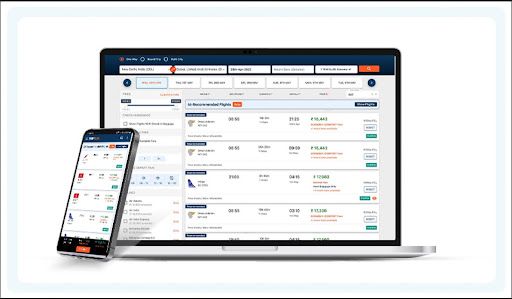AI-Powered Recommendations in Corporate Travel: Hype or Game-Changer?

From healthcare to finance, algorithms are automating tasks, predicting trends, and more with unprecedented efficiencies. While AI is proving its worth across various industries, to what extent can AI address the granular challenges of corporate travel? We are not merely discussing rudimentary booking procedures - we are examining the capacity to navigate the complexities of dynamic pricing, stringent policy adherence, and consideration of duty of care.
Challenges of Traditional Corporate Travel Booking
Corporate travel management has evolved from just transactional processes to serious business decisions. However, despite the digital progress, the system can be overwhelming due to the existing operational inefficiencies.
Inefficient Decision-Making
Choosing the right option from hundreds of flights and hotels can be tedious and time-consuming. Travel coordinators are burdened by a surfeit of flight and accommodation options, attempting to reconcile disparate schedules and ensure policy compliance. Yet, many companies fail to capitalize on real-time dynamic pricing, making organizations overspend on flights and accommodations. Studies show that business travelers spend an average of 2.5 hours per trip researching and booking travel (source).
Scheduling Misalignment
Misaligned travel schedules and dynamic meeting agendas leading to unnecessary stress, missed meetings, and lost productivity? Manually coordinating complex travel itineraries with changing meeting schedules brings in logistical challenges, disrupting business operations. The GBTA estimates that missed connections and inefficient itineraries cost businesses millions in lost time and rescheduling fees annually (source).
Traveller Safety Issues
Manual verification processes, relying on outdated information, inherently expose travelers to undue risks, directly contravening the fundamental principles of duty of care. A significant challenge for over 60% of companies is effectively managing travel risk, which increases liability and jeopardizes employee safety, states the International SOS Travel Risk Map.
Missed Corporate Discounts and Perks
Corporate negotiated rates often include complimentary meals, flexible cancellations, loyalty perks, and more. But employees mostly overlook these benefits, failing to leverage negotiated corporate discounts and preferred vendor rates, resulting in increased travel expenditure and reduced return on investment.
Policy Compliance Challenges
Employee bookings outside established corporate policies create financial leakage, making it harder to track expenses and optimize budgets. Without a centralized system enforcing policy adherence, tracking expenses and maintaining budget control is a constant struggle.
Can AI Make a Difference?
Organizations are increasingly recognizing the need for business travel management solutions that optimize efficiency, control costs, and enhance the overall traveler experience - an intelligent, data-driven solution. AI-driven recommendations can transform the corporate travel management system, making the entire process seamless and strategic. Leveraging AI-driven solutions can lead to a reduction in company travel expenses by up to 25%, according to a 2023 report by McKinsey & Company.
Advantages of AI-Powered Corporate Travel Recommendations
Cost Optimization
AI continuously scans pricing trends, ensuring businesses book at the most cost-effective time. Unlike manual searches, AI-powered platforms nudge employees to select negotiated corporate rates. and enforce corporate travel policies automatically. By analyzing historical data and identifying preferred vendors, AI can facilitate significant cost reductions.
Seamless Alignment with Business Itineraries
Imagine a system that seamlessly integrates travel itineraries with meeting schedules, selects secure accommodations, and automates policy enforcement. Yes, AI can optimize business travel bookings to alleviate administrative burdens and empower employees to focus on strategic priorities. AI-driven itineraries sync seamlessly with business schedules - no more airport sprints or rescheduled calls.
Enhanced Traveler Safety
AI flags potentially risky accommodations or transportation options by evaluating real-time safety ratings. Studies state that AI-driven travel management can reduce security issues by up to 40% by selecting safer routes and accommodations, providing a substantial boost to traveler well-being.
Elevated Employee Experience
By integrating personal preferences—such as preferred airlines, hotel chains, or meal options—AI creates a travel experience tailored to individual needs, making business trips less of a hassle and more of a strategic advantage.
Introducing TripGain’s AI-Driven Business Travel Optimization Platform

AI-powered corporate travel recommendations are no more a futuristic concept but a present-day necessity. Thus, TripGain’s unified travel and expense management platform now leverages advanced artificial intelligence algorithms to optimize corporate travel experiences. It provides recommendations to enhance efficiency, cost-effectiveness, and traveler well-being by analyzing extensive data sets and incorporating industry best practices. Learn more about TripGain’s AI-powered solution and how it helps save business travel costs by up to 30%.
So, the question is not whether AI will impact corporate travel - because it already is. It’s how effectively businesses can leverage the capabilities of AI to create a more efficient, secure, and cost-effective future.

Ramu Achala
Product ManagerIn this article
1.Challenges of Traditional Corporate Travel Booking
2.Advantages of AI-Powered Corporate Travel Recommendations
3.Introducing TripGain’s AI-Driven Business Travel Optimization Platform



